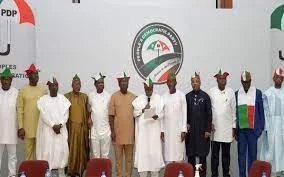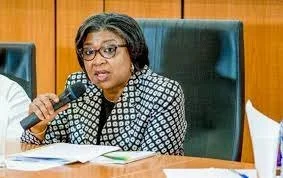Deep in debt: Worries over Nigeria’s borrowing spree
Nigeria’s debt burden has been described as unsustainable, but this has not stopped the country from borrowing further, OKECHUWKU NNODIM writes
Financial experts and other stakeholders are concerned about the Federal Government's choice to continue borrowing cash in the face of the country's mounting and unsustainable debt burden.
According to the country's Debt Management Office, Nigeria's total public debt increased to N87.38 trillion at the end of the second quarter of this year. This represents a 75.29 percent gain, or N37.53 trillion, over the N49.85 trillion recorded at the end of March 2023.
According to DMO data, Nigeria's total internal debt is N54.13 trillion, while its total external debt is N33.25 trillion. Domestic debt accounts for 61.95 percent of overall debt, while external debt accounts for 38.05 percent.
The DMO stated in its 2022 Debt Sustainability Analysis Report that the Federal Government's expected revenue of N10tn for 2023 could not support new borrowings.
According to the agency, the government's estimated debt service-to-revenue ratio of 73.5 percent for this year is excessive and poses a risk to debt sustainability. It stated that the government's present revenue profile could not support increased borrowing levels.
"Of course, this is true; Nigeria's debt burden is clearly unsustainable right now, and the government needs to slow down on borrowing," Dr Muda Yusuf, Chief Executive Officer of the Centre for the Promotion of Private Enterprise, observed.
Despite the DMO's and experts' concerns over the country's debt, Sunday TalkTalk Nigeria announced earlier this month (October) that the Federal Government was currently negotiating a new $1.5 billion loan with the World Bank.
According to the article, the loan, abbreviated as HOPE, was named 'Nigeria Human Capital for Opportunities and Empowerment,' and was obtained from the Washington-based institution's website.
The loan's declared goal was "to strengthen systems for improved delivery of basic education and primary health services in participating states."
The loan is scheduled to be implemented in 2024, pending approval by the World Bank Group's board of directors. The report also stated that there was another loan titled, 'Nigeria Macro-Fiscal Reforms for Economic Stability and Economic Transformation,' and that there were pending discussions on five other loan projects, including $300 million for solutions for internally displaced persons and host communities, $500 million for rural access and agricultural marketing, and $500 million for rural access and agricultural marketing.
The discussions will determine if the loans will become active or dropped. The report further stated that so far, Nigeria had secured a total of $1.95bn in loans from the World Bank in the first four months of President Bola Tinubu’s administration. The first was the $750m approved on June 9, 2023, to boost Nigeria’s power sector. The second was $500m to help the country’s drive for women’s empowerment and was approved on June 22, 2023. The third was a $700m loan to enhance adolescent girls’ learning and empowerment, which was approved on September 21, 2023.
Commenting further on the development, Yusuf said, “We cannot continue like this. Our debt level has reached a point now that is clearly unsustainable. You know our debt profile now is over N87tn, and the DMO has added the Ways and Means advances that were securitised. So, the thing has jumped to over N87tn.
“And the debt service burden is still extremely heavy; almost 100 per cent of our revenue. So, the debt situation is extremely bad. Therefore, this is not the time to borrow for projects that cannot significantly add value to productivity.”
Yusuf pointed out that the administration of former President Muhammadu Buhari negotiated some loans with the World Bank before he left office. He, however, stated that if the current government must borrow, it should not be for servicing recurrent expenditures, but must be targeted on capital projects that would attract income.
“Personally I don’t think this is the right time to be borrowing that kind of money (the $1.5bn loan). We need to be very careful about the way we go about borrowing, given the enormity of the debt service burden, the current size of our debt, and our very limited capacity to service both domestic and external debts.
“If we must borrow, it should be something that can support real productivity in the economy. I’m not saying education is not important, but we should be looking at more structural issues. You are dealing with an infrastructure deficit and a problem of logistics, these things make productivity to be extremely low, thereby affecting the competitiveness of our economy. So, they are much more fundamental,” the CPPE boss stated.
On Ways and Means financing of fiscal deficit, he said, “Ways and Means finances of the Central Bank of Nigeria must be kept within statutory limits to avoid the damaging impacts of high-powered money on the macroeconomic environment. The experience of the last few years must not be allowed to repeat itself.”
Also commenting on the issue, a former President of the Association of National Accountants of Nigeria, Dr Sam Nzekwe, wondered how the government would be able to raise funds to pay the additional N35,000 that it promised civil servants.
"The Tinubu administration has not settled down to see where the economy is going." They have promised to pay N35,000 more to each civil staff. But the question is, where will the money come from? That announcement is not supported by any appropriation. So one may anticipate that they will make an appropriation to fund that. Several additional announcements had also been made, with no appropriation to back them up.
“Now all these things require money, but where are they going to get money to finance them? Is it by borrowing? If you borrow to finance all these things, it means you are now financing recurrent expenditure, which is too bad because it is not taking us anywhere,” Nzekwe stated.
The former ANAN president stated that though he was not totally against the act of borrowing by the government when such funds were acquired, they should be deployed into capital projects.
“I am not totally against borrowing, but it should be for capital development. Is it to finance roads, infrastructure, or which capital project? But if the money goes to recurrent expenditure, then it is too bad,” he stated.
On his part, the Secretary of the Independent Petroleum Marketers Association of Nigeria, Abuja-Suleja, Mohammed Shuaibu, said the government would have reduced its borrowings had it been Nigeria’s refineries were working.
"Recently, the NNPCL announced that it had secured a $3 billion loan to help the local currency and boost activity in the oil sector." There wouldn’t be a need for such a level of borrowing if our refineries were working. The government should work hard to get our refineries running. It will save Nigeria a lot of dollars. It will relieve pressure on our currency. It will generate jobs and provide a steady supply of refined products. Marketers will no longer chase bucks for imports.
"The benefits are enormous." So, if they truly want to minimize the level at which they borrow billions of dollars, one sure way to help is to ensure that our refineries are brought back up as soon as possible," Shuaibu added.









